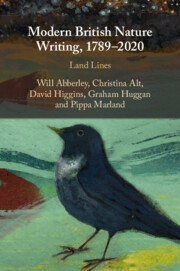Afterword
Shades of White
Published online by Cambridge University Press: 10 March 2022
Summary
The Afterword addresses the historical dominance of white voices in British nature writing, and the marginality of race, class and gender politics in the genre. This tendency matches continuing inequalities in the social and ethnic composition of British environmentalist movements. Contemporary nature writing also reflects regional inequalities, with many of its leading figures clustering around East Anglia. Nonetheless, Elizabeth-Jane Burnett’s recent book The Grassling exemplifies British nature writing that stands out not only through the unconventional background of its author, but also through its experimental techniques. At the same time, platforms such as The Willowherb Review suggest that the genre and the critical culture around it are gradually changing to allow room for more diverse voices. However, nature writers of colour venturing into rural environments still find themselves contending with the stark racial divide between Britain’s cities and countryside. Similarly, a growing range of LGBTQ* nature writers are becoming increasingly visible in the genre and challenging heteronormative codings of the rural. In the aftermath of Brexit and a global pandemic, Britain’s nature writers confront a nation highly divided and isolated, and a literary heritage permeated by elitist elements which need to be reckoned with.
- Type
- Chapter
- Information
- Modern British Nature Writing, 1789–2020Land Lines, pp. 255 - 265Publisher: Cambridge University PressPrint publication year: 2022

